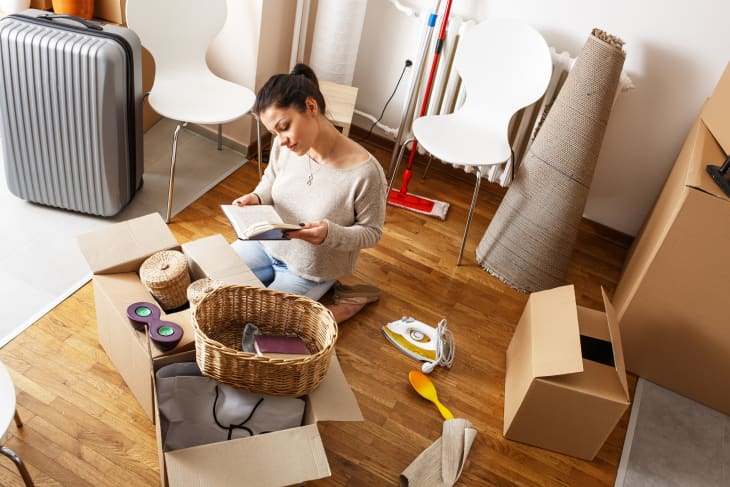So You’re Moving Out of Your Parents’ House. Here’s What a Pro Organizer Says to Do First

It might be in the basement. It could be in the attic. Maybe it’s underneath your bed or tucked into the depths of your closet. The “it” in question? All of your stuff. If you’re moving out of your parents’ house, you’ll have to face the monster that it is and organize it out of existence.
For a move so monumental, the hardest part can be figuring out where to start, no matter what age you fly the nest. I talked to Sarah Buckwalter, seasoned founder of the professional organization company Organizing Boston, to find out exactly where that is.
Step 1: Sort and assess.
As counterintuitive as it may sound (and as much as they might hate to hear it), your parents should not help you move out. “When someone is at that point where they’re trying to get some independence, it might be better if they’re making the decisions,” Buckwalter says. Having a parent over your shoulder while you’re trying to part with childhood belongings can add to the guilt and stress of the process. Or maybe it won’t — but she advises to pay close attention to how you’re feeling and who you’re with throughout the process. “Don’t let other people get involved if they’re not being helpful,” she says.
The three key questions to ask as you sort through your belongings: Do you need it? Use it? Love it? “But it’s deeper than that,” acknowledges Buckwalter. “It’s asking yourself if this is something that is going to serve you in your new home and your new life.” It’s perfectly reasonable to keep a few boxes of mementos for sentimentality’s sake, but for pieces that are hard to part with, she suggests taking photos of those college keepsakes or donating that sequin-studded prom dress to someone who could still wear it. The thing you want to avoid is having your stuff languish in your family’s house for years — or decades.
Step 2: Fill in the gaps.
Decluttering can happen at any point — a month or three before leaving is ideal, according to Buckwalter. But this next step hinges on knowing where you are going next. Your own apartment? A house? A shared room? Once you know, you’ll want to make an inventory of the things you’ll need to acquire to make that space fun and functional.
“Think about what your ideal situation looks like out of your parents’ home,” she says. “It’s really good to plan and write the things you want and need for your space.” Do you hope to cook elaborate dinners all the time? Do you need to work from home? Will you get things from a thrift shop or new furniture store? Cataloging these thoughts can ease the chaos of the move.
Next, consider your style. Leaving home also means parting with a place largely dominated by your parents’ tastes, and unpacking into a space that feels like your own. Buckwalter recommends going on Pinterest, watching HGTV, and reading sites like Apartment Therapy for ideas of what you do and don’t want for your own home.
Step 3: Live a little.
There’s no need to get everything right on the first go. Moving out of your parents’ house can look different for everyone: Maybe you leave a few boxes tucked in the attic and come back for them later. Maybe they do help you every step of the way. Maybe you have no qualms tossing away everything. Whatever the case, once you start settling into your new digs, chances are you’ll have a few surprises. That’s completely fine, says Buckwalter, and it’s even kind to your wallet to start with the basics and add more furnishings as you go.
Equally as important as the stuff, though, are the boring intangibles: Be sure to set up utilities, schedule bill payments, create a budget, and all of the other mundanities that come with leaving home before you’ve done so. Now comes the fun part: Live a little! Eat cereal for dinner, lean into your personal style, and figure the rest of it out along the way.